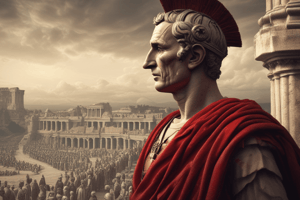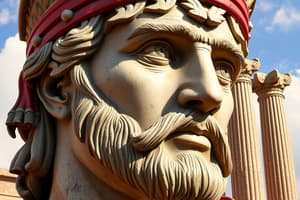Podcast
Questions and Answers
Who played a crucial role in the events that led to the end of the Roman Republic?
Who played a crucial role in the events that led to the end of the Roman Republic?
- Lepidus
- Mark Antony
- Julius Caesar (correct)
- Augustus
Which military commander and politician was assassinated in 44 BC, leading to a period of civil war in the Roman Republic?
Which military commander and politician was assassinated in 44 BC, leading to a period of civil war in the Roman Republic?
- Julius Caesar (correct)
- Octavian
- Lepidus
- Mark Antony
Which triumvirate emerged victorious in the civil war that followed Julius Caesar's assassination?
Which triumvirate emerged victorious in the civil war that followed Julius Caesar's assassination?
- Augustus, Lepidus, Julius Caesar
- Julius Caesar, Mark Antony, Lepidus
- Mark Antony, Octavian, Lepidus (correct)
- Julius Caesar, Augustus, Mark Antony
What significant event marked the establishment of the Roman Empire in 27 BC?
What significant event marked the establishment of the Roman Empire in 27 BC?
Which reformer is credited with the establishment of the Julian calendar and the granting of citizenship to various communities in the Roman provinces?
Which reformer is credited with the establishment of the Julian calendar and the granting of citizenship to various communities in the Roman provinces?
What form of government did Octavian establish during his reign?
What form of government did Octavian establish during his reign?
What event marked the end of the Roman Republic?
What event marked the end of the Roman Republic?
Who was Octavian's adopted father?
Who was Octavian's adopted father?
Which alliance did Octavian form after Julius Caesar's assassination?
Which alliance did Octavian form after Julius Caesar's assassination?
What marked the beginning of the Roman Empire according to the text?
What marked the beginning of the Roman Empire according to the text?
Flashcards are hidden until you start studying
Study Notes
Roman Republic
The Roman Republic was the political and social system that governed the ancient Roman civilization from its founding in 753 BC until the establishment of the Roman Empire in 27 BC. It was a complex system that combined elements of a monarchy, an aristocracy, and a democracy, with a Senate that advised the consuls who were the chief magistrates. The Roman Republic was marked by periods of stability and prosperity, as well as times of civil strife and political turmoil.
One of the most notable figures during the Roman Republic was Julius Caesar, a renowned military commander and politician who played a crucial role in the events that led to the end of the Republic. After Caesar's assassination in 44 BC, the Roman Republic entered a period of civil war, which culminated in the victory of Mark Antony, Octavian (later known as Augustus), and Lepidus, known as the Second Triumvirate.
Julius Caesar
Gaius Julius Caesar was a Roman politician and military general who played a crucial role in the events that led to the end of the Roman Republic. He was born into a noble family in 100 BC and rose to prominence through his military exploits, particularly during the Gallic Wars, which expanded Rome's territories into modern-day France.
Caesar was known for his reforms, which included the establishment of the Julian calendar, the construction of new roads, and the granting of citizenship to various communities in the provinces. However, his political ambitions and military conquests led to his assassination in 44 BC, an event that marked the end of the Roman Republic.
Octavian (Augustus)
Gaius Octavius Thurinus, later known as Octavian and later as Augustus, was the first emperor of the Roman Empire. He was born in 63 BC and was the adopted son of Julius Caesar. After Caesar's assassination, Octavian formed an alliance with Mark Antony and Lepidus, known as the Second Triumvirate, to restore order in Rome and fight against Caesar's assassins.
Octavian's reign, which lasted from 27 BC to 14 AD, is considered the first stage of the Roman Empire. He established a form of government known as the principate, which combined elements of the republic with the traditional powers of a monarchy. During his reign, Octavian stabilized the empire, maintained peace, and developed the infrastructure, including roads and aqueducts. He also worked to maintain the structure of power for his successor, which ultimately led to the Julio-Claudian dynasty.
Studying That Suits You
Use AI to generate personalized quizzes and flashcards to suit your learning preferences.




